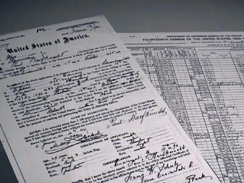Searching for our roots
Father's Day is a day for all in the family to celebrate, except for those who, through no fault of their own, have no idea who's exactly at the root of their family tree. Our Cover Story is reported by Tracy Smith:
At 55, Kevin Giddins is only now starting to find out who he really is. Just after he was born, his unwed teenage mother gave him up for adoption.
With no real family history, and no ties to any of his blood relatives, Giddins was basically a stranger to himself.
When asked if he felt "incomplete," Giddins replied, "Definitely. I knew nothing about me. Can you imagine growing up knowing nothing about your health, your family? You're nothing. At school, when kids have reports on their family history, there is Kevin with nothing."
He knew he wanted to trace his roots -- he didn't know how relatively easy it would be.
Genealogy -- the study of family ancestry -- has become a multi-billion-dollar business.
It's said to be the second biggest hobby in the United States, right behind gardening. And online, genealogy is the second most-visited website category; only porn is more popular.
USC professor Vern Bengtson says we all have a built-in desire to know where, and whom, we come from. "We want to find out about the highs and the lows, the triumphs, the tribulations of people whose genes we carry," Bengtson said. "I have my grandfather's hairline. I'm not terribly proud of it. I think it's a bit unfortunate. But it's part of me. It's part of my genes. It's part of my inheritance."
And if you want to trace your family back through time, Salt Lake City is the place. It's home to the Mormon Church, whose members trace their family trees to find ancestors who died without being baptized, so they can be baptized posthumously and brought into the fold.
The Mormons have the largest family search library on Earth. And just down the road is the largest commercial ancestry service in the world: ancestry.com.
There, they spend a lot of time reading microfilm and sorting through old court records and books. And for fees that start at around $20 a month, they'll give you access to their database, and maybe a peek into your past.
- 1940 U.S. Census data released online
- Genetic Genealogy: Rebuilding the family tree ("60 Minutes," 10/05/07)
When asked what people are most interested in finding out, Michelle Ercanbrack, an Ancestry family historian, replied, "Am I related to a celebrity?"
Smith asked, "Why is it such an emotional journey for some reason?"
"Because it's so personal," Ercanbrack said. "There are things that you can learn about yourself and your family that you can't learn in any other way."
There are billions of records people can search through, from the comfort of their home.
And it can all be pretty entertaining: Ancestry.com helps produce several different TV shows where celebrities climb their own family trees, like TLC's "Who Do You Think You Are?" Our CBS colleague Julie Chen traced her roots in China, and learned that her maternal grandfather was a business tycoon, with many wives and many children. "So I have a lot of relatives," Chen said.
And before her grandfather died of cancer at age 62, he founded a school that stands to this day. "I'm, like, 'Wow! Grandpa had, like, a big heart, and could see past his own suffering,'" Chen said. "I wish I were that big of a person. I don't know if I would be."
"You have that in you," said Smith. "That's the point of this."
"I hope, I hope. You know, you never know. You say, 'Oh, I would do this if I was in his shoes or her shoes.' But you never know until you're faced with it."
Smith's own family's story is far less compelling, but still pretty interesting. Ancestry found documents showing the exact date her ancestors stepped off the boat from Germany in 1883 -- pre-Ellis Island. They also found the boat, the Westphalia.
Ercanbrack also found a yearbook photo of Smith's mother. "How crazy is that?" Smith exclaimed.
And if you want to go really deep, ancestry.com is one of more than two dozen companies that will probe your DNA. The results can potentially tell you who you're related to, where in the world you came from, and what your ethnicity might be.
"We're actually, in some cases, finding ancestors for people that know nothing about where they come from," said Ancestry CEO Tim Sullivan.
He says DNA tests are helpful, to a point: "We're very accurate in assessing or determining who is a close cousin or a close family member. And I say, 'close,' sort of in third, fourth, or maybe fifth cousins. As it gets out to that edge of fifth cousins there are some false positives and false negatives. But it's actually pretty accurate."
In Kevin Giddins' case, the results were good enough to give him details of a past he'd only imagined.
"As I do my history, from what plantation I was from, you can find out the records of where the slave owner bought those slaves from. You can trace it all the way back to an African culture," he said.
"Wow. I picture a trip to Africa coming," Smith said.
"Oh, girl, you don't know! I'm excited for that."
Giddins also located a few blood relatives, who helped lead him to the one person he'd dreamed of all his life: his birth mother, still alive and living in South Carolina.
"I found a cousin through a DNA test," Giddins said, "and then a cousin found a nephew, and then eventually found her children, and eventually found her."
And what was that like? "Well, it was pretty, pretty special," he said. "She said, 'I'm the mother on your birth certificate.' I stood for, I thought, hours thinking, 'I finally found her.'"
And next month, Kevin will take his whole family to meet her. The Giddins family portrait will get a little bigger, a little happier.
"Once you have truth and you can live in your truth, that gives you power," Giddins said. "And I'm grateful that I can now live in my truth, knowing who I am and who my family is. That's what the DNA test, that's what searching ancestry did for me, is allow me to live in my truth."
For more info:
- ancestry.com
- familysearch.org
- Explore Genforum surname forum at genealogy.com
- geni.com
- Global Family Reunion: The Great Surname Showdown to Fight Alzheimer's
- Statue of Liberty - Ellis Island Foundation
- The USGenWeb Project
- Professor Vern Bengtson, USC School of Social Work
- "Finding Your Roots" (PBS)
- "Genealogy Roadshow" (PBS)
- "Who Do You Think You Are?" (TLC)

